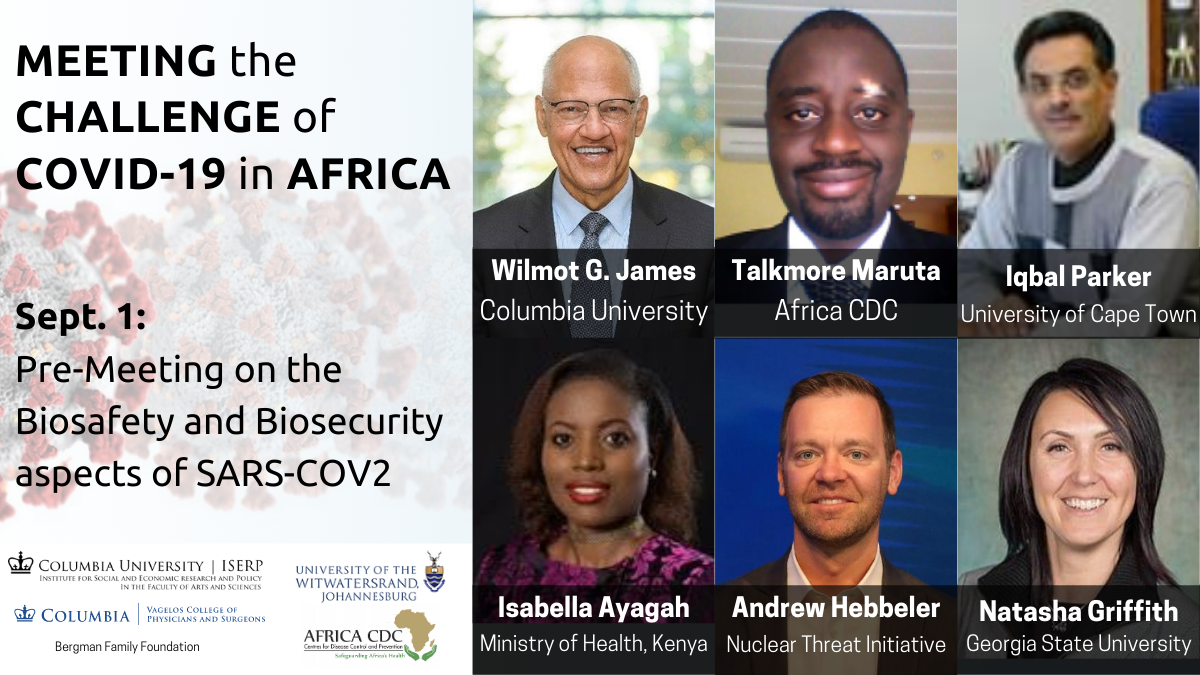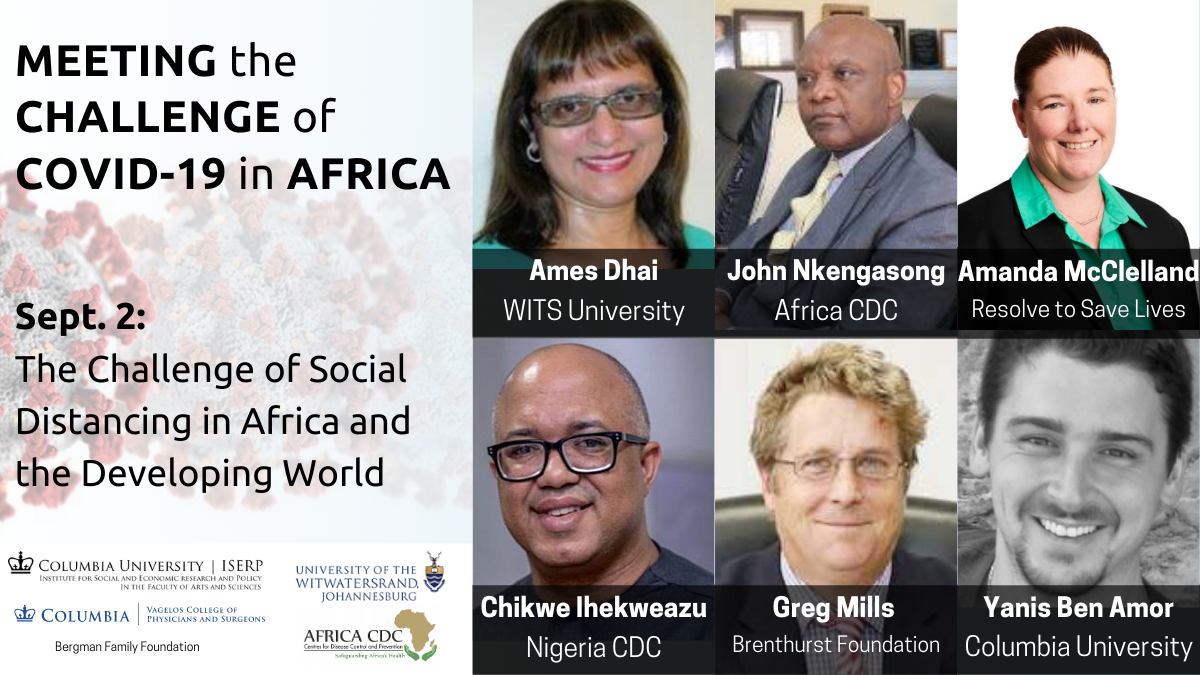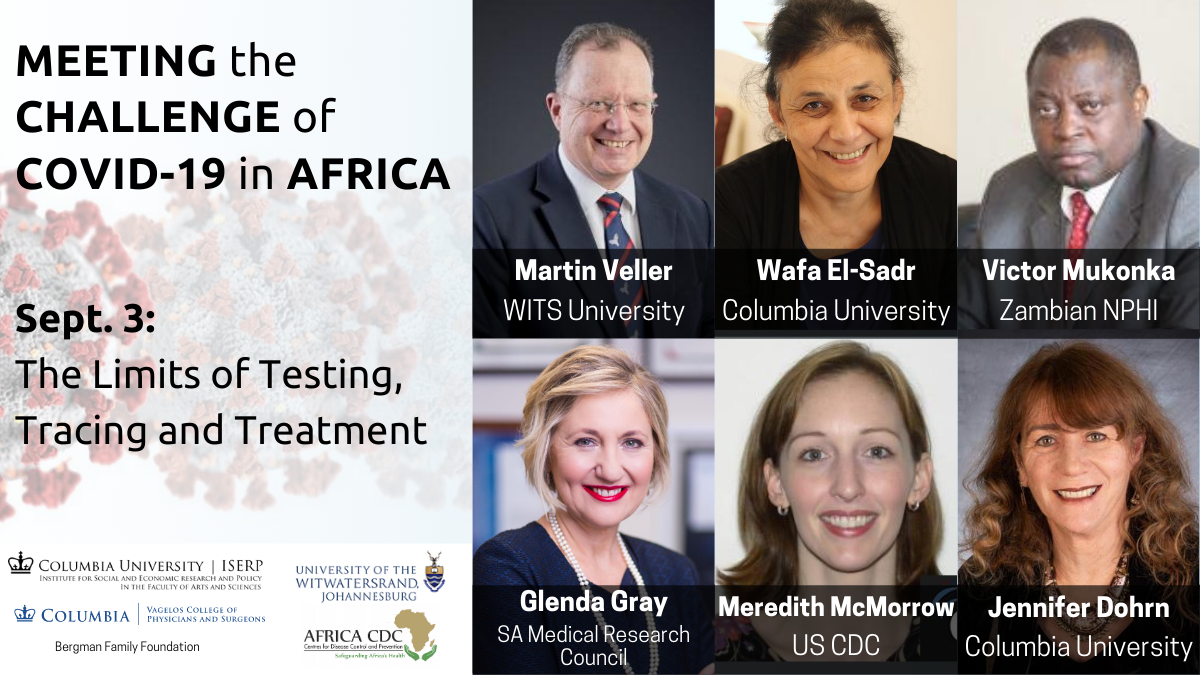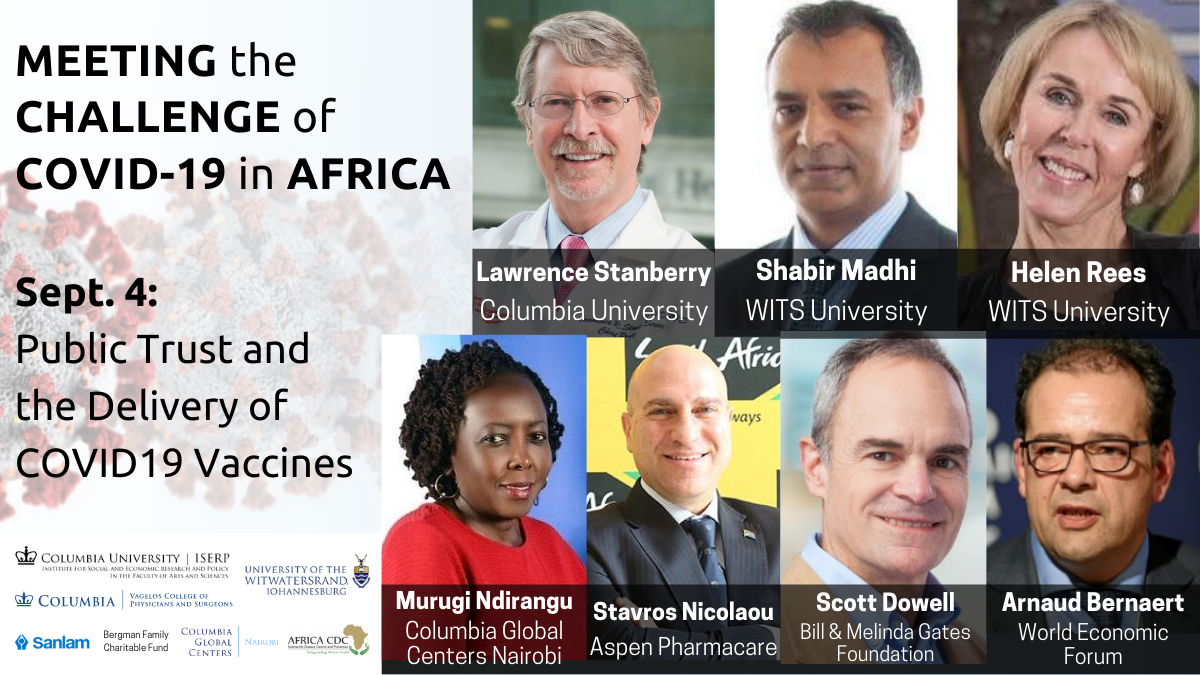Meeting the Challenge of COVID-19 in Africa
New: Session recordings and articles featuring symposium content and Op-Eds written by speakers are now linked with each session discription below.
A Virtual Symposium
9-11AM EST | 3-5PM CAT
Center for Pandemic Research, Institute for Social and Economic Research and Policy, Columbia University, New York City, and the Faculty of Health Sciences, University of the Witwatersrand, Johannesburg.
Co-sponsored by the Programs in Global Health, Vagelos College of Physicians and Surgeons, Columbia University, the Stanley and Marion Bergman Family Charitable Fund and the Sanlam Foundation.

The purpose of the symposium is to focus on the key challenges of dealing with a delayed but explosive unfolding of the COVID-19 pandemic in parts of Africa and to identify best practice solutions in respect of (1) gaining of public trust in adhering to the health imperatives of social distancing and the use of approved therapies and vaccines to manage and contain outbreaks; (2) the dynamic and most-effective use of testing, tracing and isolation as public health tools during a pandemic; and (3) the scaling up of SARS_COV2 vaccine acquisition and distribution platforms that will serve all African countries for mass immunization. A pre-meeting on the biosafety and biosecurity aspects of the SARS_COV2 pathogen will be held on 1 September.
Pre-Symposium Op-Ed by Drs. Lawrence Stanberry and Wilmot James: Africa needs to do more to position itself to benefit from future Covid-19 vaccines
*See below daily session descriptions and speakers information.
Symposium Program | Questions? Contact [email protected]
Daily Topics and Featured Speakers
September 1: Pre-meeting on the Biosafety and Biosecurity Aspects of SARS-COV2
Op-Ed by Talkmore Maruta: Covid-19: Guarding against the misuse of highly pathogenic agents
Because of the COVID-19 pandemic, laboratory (research and diagnostic) capacity has increased globally, as have the risks related to biosafety and biosecurity, those especially related to what is known as dual-use research and development. That dual use research may result in misuse is a long-standing science concern. Issues include not only research and public health, but also security, scientific publishing, public communications, biotechnology, ethics and wider societal issues. In this session, we will discuss some of the dual-use concerns as related to the current COVID-19 pandemic.
Special Message: Dr. Tedros Adhanom Gebreyesus, Director General, World Health Organization
Moderator: Wilmot James, Columbia University
Keynote: Talkmore Maruta, (Africa CDC)
Panelists: Iqbal Parker (University of Cape Town); Isabella Ayagah (Ministry of Health, Kenya); Andrew Hebbeler (Nuclear Threat Initiative); and Natasha Griffith (Georgia State University)

September 2: The Challenge of Social Distancing in Africa and the Developing World
Op-Ed by Amanda McClelland: Striking a balance: Public health and social measures in Africa
Recording coming soon.
Reducing the rate of infection (R0) in a population is central to health systems coping with surges in patients requiring care in infectious pandemics. The most tried and tested method of doing this is to secure adherence to social distancing. Achieving effective social distancing however requires that communities have the resources that make this possible.
Special Message: Lazarus Chakwera, President of Malawi
Moderator: Ames Dhai (WITS University)
Keynote: John Nkengasong (Africa CDC)
Panelists: Amanda McClelland (Resolve to Save Lives); Chikwe Ihekweazu (Nigeria CDC); Greg Mills (Brenthurst Foundation); and Yanis Ben Amor (Columbia University)

September 3: The Limits of Testing, Tracing and Treatment
Recording coming soon.
The use of frequent testing, followed by active contact tracing and early treatment of infected patients is an effective form of limiting the spread of an infectious agent. Making this strategy work requires that all aspects of this strategy function effectively. The current experience in the SARS-COV-2 pandemic suggests that achieving this can be very difficult.
Moderator: Martin Veller (WITS University)
Keynote: Wafaa El-Sadr (Columbia University)
Panelists: Victor Mukonka (Zambian Public Health Institute & Africa CDC), Glenda Gray (SA Medical Research Council); Meredith McMorrow (US CDC); and Jennifer Dohrn (Columbia University)

September 4: Public Trust and the Delivery of COVID19 Vaccines
Op-Ed by Shabir Madhi: Why Africa needs to be involved in the development of Covid-19 vaccines
Article by Sandisiwe Shoba: Covid-19 vaccine: Africa is at the back of the queue, says Shabir Madhi
The value in controlling the COVID-19 pandemic is not only dependent on the efficacy of a vaccine. It also requires that the majority of people are prepared to be vaccinated. Achieving this means that communities trust this intervention.
Special Welcome: Murugi Ndirangu (Columbia Global Centers | Nairobi)
Moderator: Lawrence R. Stanberry (Columbia University)
Keynote: Shabir Madhi (WITS)
Panelists: Helen Rees (WITS); Stavros Nicolaou (Aspen Pharmacare); Scott Dowell (Bill & Melinda Gates Foundation), Arnaud Bernaert (World Economic Forum)

Course Staff
Dr. Wimot G. James, Senior Research Scholar, ISERP
Harlowe Wang, Program Coordinator, ISERP
Lewis Thompson, Student, School of General Studies
